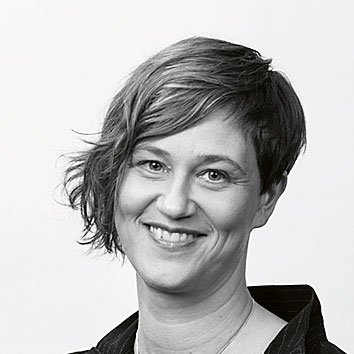Total silence. That is how it has been in relation to the issue of autism and ADHD among researchers and teachers, according to Karin Thorasdotter. She worked as a national officer at SULF for eight years, but has been a negotiator at the trade union SRAT since the autumn. Only in her last two years at SULF did she receive occasional questions from members, such as ‘Do I need to tell my boss that I have been diagnosed?’ and ‘What kind of workplace adjustments am I entitled to?’.

Karin Thorasdotter
Negotiator at SRAT, former national officer at SULF
The answer to the first question is no. You do not need to tell your manager about your diagnosis. However, in order for the employer to fulfil its work environment responsibilities, your manager needs to know what problems you encounter at work. Only then can they make any adjustments required by the Work Environment Act.
“We need to raise awareness of ADHD and autism,” says Thorasdotter, “but the adaptations needed in the workplace are different for different people.”
If the employer suspects an employee of negligence or misconduct, that makes it even more important for the employee to inform their manager about the challenges they face due to a neuropsychiatric disorder (ND), Thorasdotter continues. These could include difficulties in interpreting policies and instructions, problems with performing repetitive administrative routines correctly and on time, or something else entirely. If the employer and the local trade union representatives are aware of the difficulties and that they are due to a neurodevelopmental disorder, the union is in a much better position to support the member.
One person who has worked to increase her own and her colleagues’ knowledge about neurodevelopmental disorders is Anna-Karin Ivert, Head of the Department of Criminology at Malmö University. Her initiative was well received by the HR department, but it could not provide expertise. She also found it difficult to find external actors with knowledge of academia as a workplace for people with ADHD or autism.
Thanks to a tip, in spring 2024 she finally found Hanna Bertilsdotter Rosqvist at Södertörn University and invited her to hold some workshops on neuro-inclusive work environments.
Participants were asked to think about their own and other people’s needs, ask questions and got concrete advice on how to make their organisation more inclusive. This might involve how meetings are organised, not leaving things implicit and creating opportunities for breaks and privacy during team working and development days. Ivert believes there are many tools that would be useful for the entire department’s work environment.
“I learned that it is important that I am even clearer in my communication. If I want us to do something in steps 1, 2 and 3, I should not leave it open to interpretation. Before, maybe I wrapped things up more or didn’t express myself in concrete terms,” she says.

Anna-Karin Ivert
Head of the Department of Criminology at Malmö University.
She also thinks more about planning ahead at work now.
“Some people have more difficulty with sudden changes. I try to see the signs, but I also depend on being informed that ’I have this need’.”
Doctoral candidates with ADHD or autism are entitled to workplace adjustments, both as staff and as students. However, to be eligible for targeted educational support as a student, a formal diagnosis is required.
The proportion of students receiving targeted educational support due to a diagnosed neurodevelopmental disorder has increased steadily and significantly. In 2011, 0.3 per cent of the student population had such support; in 2023, the figure was 2.7 per cent.
The national pot of money for targeted educational support has not grown at the same rate as the needs. In 2023, the budget covered only 41 per cent of higher education institutions’ costs for the support.
The support functions at higher education institutions that make decisions on pedagogical support have knowledge of ADHD and autism. But to better meet the needs of students, Anna-Karin Ivert believes that expertise on neurodevelopmental disorders needs to be improved more broadly in the higher education sector.
“It can be difficult to understand what an educational adaptation involves or how it should be designed just on the basis of a decision from Educational Support.”
Lund University is the largest employer in the higher education sector, with 7606 full-time employees in 2023. But Universitetsläraren has the same experience with the HR department there as Ivert encountered at her university. There is interest in raising the issue of ADHD and autism in the workplace, but they cannot recommend anyone there who has any in-depth expertise or experience of working with it for us to interview.
However, Cecilia Hagström, work environment coordinator at the Faculty of Social Sciences in Lund, is happy to be interviewed. She has started to think in terms of cognitive accessibility and cognitive ergonomics, and she has noticed that these aspects of the work environment are not brought up as much as others.
“It’s important to work both so that the organisational setting works for as many people as possible and so that individuals get the adaptations they are entitled to under the Work Environment Act,” she says.

Cecilia Hagström
Work environment coordinator at the Faculty of Social Sciences at Lund University
Both systematic surveys and dialogue are required, she believes. Managers may also need both more knowledge and dialogue support.
“We must make sure we ask the right questions so that we don’t act on a stereotype that may be based on poor knowledge and lead to the wrong kinds of workplace adaptation.”
She does not think that the HR function at Lund University is unique in its lack of expertise in ADHD and autism.
“Unfortunately. That doesn’t mean that no one is working with it, but maybe we haven’t made it very clear and fully functional, and above all not as highlighted and inclusive as I would like. My goal is to approach it more explicitly.”
She also wants to hear positive stories from the organisation. When has a person with ADHD or autism received good support? What made people choose that workplace and stay there?
“We must not overlook the gender aspect of this either. We know that ADHD and autism can manifest themselves differently in women and men, and we know that women have higher rates of sick leave and are less satisfied with their work environment. This is where we employers can make a difference.”
Neurodevelopmental disorders (ND)
ND is an umbrella term for various neuropsychiatric diagnoses. ADHD (attention deficit hyperactivity disorder) and autism are the most common. Others are ADD (attention deficit disorder), dyslexia and language disorder. Symptoms also vary within the different groups. The term neurodiversity is used to emphasise the naturally occurring variation in human cognitive functioning. The most common modes of functioning are called neurotypical; the less common are called neurodivergent.

















